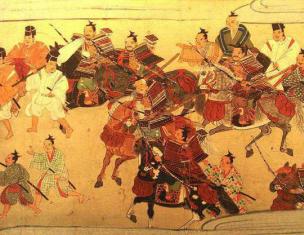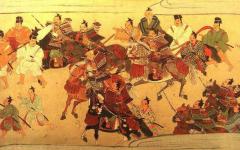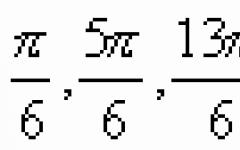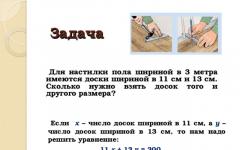Composition
Lyrical hero- this is the appearance of a person and the structure of thoughts and feelings that arises in the works of a particular poet. What is A. Akhmatova’s lyrical heroine like? Perhaps one of its most important features is some kind of emphasized visibility. The poet’s appearance features - Akhmatov’s shawl, Akhmatov’s slimness and thinness, Akhmatov’s bangs - migrated into poetry, and when we read them, as a result we can imagine a very specific person:
*Eyes look distracted
* And they never cry again.
* And the face seems paler
* From lilac silk,
*Almost reaches eyebrows
* My uncurled bangs.
The woman A. Akhmatova writes about is beautiful and sad. Her sadness is love. Unrequited love - this feeling permeates Akhmatov's poems. Love is always pain, always difficult. Because not everyone is given the gift of love, and the lyrical heroine simply has nowhere to go with her love. Therefore, the lyrical heroine, in fact, is homeless (“ah, I’m at home, if not at home”), all the houses in which she could live turn out to be lost: The bagpipes in the distance die away, The snow flies like a cherry blossom. And apparently no one knows that there is no white house. Unrequited love becomes a source of creativity. The most significant feature of the lyrical heroine A. Akhmatova is that she is a poet. Poetic creativity constantly accompanies her life, being its main content. In poetry one finds a solution to the torments of love, and poetry is the only way to preserve what has been experienced:
* You are heavy, loving memory!
* I should sing and burn in your smoke.
Memory, which connects times, is the basis of the poet’s fate. For the lyrical heroine A. Akhmatova, not only “love memory” is important, but above all the memory of history and the memory of culture. Having survived historical cataclysms, A. Akhmatova’s lyrical heroine understands that it is precisely then, “when an era is buried,” “you can hear how time goes by“It is at these moments that the need arises to show that the buried era has not disappeared, the past is present in the present. Therefore, in the poem “In the Fortieth Year,” the very title of which is the date of a huge social cataclysm, wars that have already passed are resurrected - the Anglo-Boer (“with Boer rifles”), the First World War (“Varyag” and “Korean” went to the east) . Lyrical heroine It is not for nothing that A. Akhmatova calls herself a Kitezh woman - after all, in the city of Kitezh, the bells began to ring on the eve of great disasters. Indeed, the lyrical heroine A. Akhmatova can be called a prophetess. Like all great poets, she is overcome by premonitions that are steadily coming true:
* I called death to my dear ones,
* And they died one after another.
* Oh woe is me!
* These graves
* Foretold by my word.
So, poetic word brings back the past and predicts the future. That is why at the end of her life A. Akhmatova will say: “I never stopped writing poetry. For me, they contain a connection with my time, with new life my people... I am happy that I lived these years and saw events that had no equal.”
The lyrical heroine of Anna Akhmatova and the poetics of symbolism and acmeism
The aesthetics of Acmeism is in many ways close to the aesthetics of symbolism: the desire for the ideal, the unknowable, deep aestheticism, interest in higher reality - all this is characteristic of both directions. However, Acmeism is a more “earthly” direction, in which the real and the ideal are balanced, in which due attention is paid to the simple human life. Often the state of feelings was not revealed directly; it was conveyed by a psychologically significant gesture, movement, or listing of things. The Acmeists’ close attention to the material, material world did not mean their abandonment of spiritual searches. Over time, the affirmation of the highest spiritual values became the basis of the work of many Acmeists. Another feature of this movement was that its representatives advocated the preservation of cultural values, therefore the work of many of them absorbed the heritage of the golden age of Russian literature as a fundamental basis.
With these general features directions of his creativity individual representatives has original features.
For example, Anna Akhmatova’s acmeism is devoid of colorful imagery. The originality of her lyrics lies in the capture of spiritual objectivity: “Through the amazing precision of the material world, Akhmatova displays an entire spiritual structure.” Ibid.. Otherwise, this technique is called the materialization of the experiences of the lyrical hero: Akhmatova’s details are associative and psychological, aimed at revealing the image of the lyrical heroine.
Acmeism's interest in objective world led the poetess to the fact that in her poems she began to rely on the psychological Russian prose of the 19th century, this was expressed in the special plot of her works, a special interest in details, the objective world. As V. Gippius said, in the era of decadence "... the novel is over, the tragedy of ten years is unleashed in one brief event, in one gesture, look, word" Quoted from: Skatov N. The Book of the Female Soul (On the poetry of Anna Akhmatova): introduction to the collected works of A. Akhmatova in 2 volumes. - vol. 1. - M.: Pravda, 1990. - P. 11. A.A. Akhmatova’s poems can be called this kind of novels of “gesture, glance, word”
A the main character of these "novels", especially in the early lyrics, is a woman who loves. Akhmatova’s lyrical heroines, with all their diversity life situations for all their unusualness, even exoticism, they carry something important, primordially feminine. There is a center that, as it were, brings the rest of the world of her poetry to itself, turns out to be its main nerve, its idea and principle. This is love. The element of the female soul inevitably had to begin with such a declaration of itself in love. In a certain sense, all of Akhmatova’s early lyrics are dedicated to love. It was in this theme that truly poetic discoveries were born, such a view of the world that allows us to speak of Akhmatova’s poetry as a new phenomenon in the development of Russian lyric poetry of the 20th century in comparison with symbolism and acmeism.
In one of her poems, Akhmatova called love the “fifth season of the year.” From this unusual, fifth time, she saw the other four, ordinary ones. In a state of love, the world is seen anew. All senses are heightened and tense. And the unusualness of the ordinary is revealed. A person begins to perceive the world with tenfold force, truly reaching peaks in the feeling of life, and this, perhaps, is exactly the side of the matter where the somewhat artificial term a k me (Greek - peak) finally receives some kind of justification.
However, it would be wrong to say that Akhmatova’s poems about love are poems about happy love. Most likely, all her lyrics are a story about how two principles struggle in the lyrical heroine: the feminine, created for earthly love, and the creative, free, whose destiny is spiritual loneliness, the element of the Word.
The influence of decadence, symbolism and acmeism on Anna Akhmatova’s lyrics is enormous, but at the same time her creative style remains deeply individual. Anna Akhmatova is one of those authors whose creative development never stopped: it evolved throughout the poetess’s entire life. Akhmatova's poetry eventually broke away from the framework of any literary direction and became truly original. Already in the earliest collection "Evening" the flock took shape, and in "Rosary" and "White" distinctive features Akhmatova's individual style. The most important of them are novelistic composition, rhythmic and intonation freedom of poetic speech, the significance of material details, and, finally, new type lyrical heroine. It is this feature that will be discussed in the following chapters of the work.
A new type of lyrical heroine in the works of Anna Akhmatova and its evolution
Anna Akhmatova created a new type of lyrical heroine, not isolated in her experiences, but included in the broad historical context of the era. At the same time, the scale of the generalization in the image of the lyrical heroine did not contradict the fact that Akhmatova’s lyrics remained extremely intimate, and at first seemed even “chamber” to contemporaries.
Her early poems present various role incarnations of the lyrical heroine, unique " literary types"1900: the bride, the husband's wife, the abandoned lover and even the marquise, the fisherman, the rope dancer and Cinderella (Cendrillona).
Such diversity of the heroine sometimes misled not only readers, but also critics. This play with a variety of “masks” was most likely aimed at preventing the author from identifying with each of them separately.
However, our task is to consider how the image of the lyrical heroine becomes more complex already in her first collections: “Evening”, “Rosary”, “ White flock", i.e. further we will talk more about ideological content Akhmatova’s lyrics, embodied in the lyrical subject.
Before moving on to consider this issue, I would like to note some features of the analyzed collections. Firstly, their composition is interesting: each collection, both thematically and structurally, represents something unified and integral. Moreover, each book corresponds to a certain stage in Akhmatova’s development as a poetess, coinciding with certain milestones in her biography (“Evening” - 1909-1911, “Rosary” - 1912-1913, (White Flock) - 1914-1917). The compositional features of Akhmatov’s collections were noted by L.G. Kikhney, who wrote: “The sequence of poems within the book was determined not by the chronology of events, but by the development of lyrical themes, their forward movement, parallelism or contrast. In general, the leaves of the “diary”, unfinished and fragmentary individually, were part of the general narrative about the fate of the lyrical hero - the poetess. They were composed as if into a lyrical novel, free in its composition, devoid of a single plot and consisting of a number of instantaneous episodes independent of each other in content, included in the general lyrical movement. Such a “book” broke up into several chapters (sections) and was united by an obligatory epigraph containing an emotionally consonant key to the content" Kikhney L.G. Poetry of Anna Akhmatova. Secrets of the craft. - M, 1991. - P. 84. Let us analyze the image of the lyrical heroine in each of these collections, let's compare them.
The love of the lyrical heroine Akhmatova is painted in tragic tones. Akhmatova's love poetry is characterized by deep psychologism and lyricism. Her heroines are different, they do not repeat the fate of the poetess herself, but their images testify to her deep understanding of the inner world of completely different psychological
the cultural makeup and social status of women. This is a young girl waiting for love (“I pray to the window ray”, “Two poems”), and an already mature woman, absorbed in love-struggle, and an unfaithful wife, ready to endure any torment for the right to love freely (“The Gray-Eyed King”, “The Husband”) whipped me with a patterned one..."), and a peasant woman, and a traveling circus performer, and a poisoner, "hawk moth and harlot." Akhmatova has many poems about failed love, about saying goodbye to her beloved. The fate of a woman poet is tragic. In the poem “Muse” she wrote about the incompatibility of female happiness and the fate of the creator. Giving up love in favor of creativity or vice versa is impossible. Here is an example of a man’s misunderstanding of a woman poet:
He talked about summer and how
That being a poet for a woman is absurd.
How I remember the tall royal house
And the Peter and Paul Fortress.
What does love mean for the lyrical heroine Akhmatova?
The love of the lyrical heroine Akhmatova is painted in tragic tones. Akhmatova's love poetry is characterized by deep psychologism and lyricism. Her heroines are different, they do not repeat the fate of the poetess herself, but their images testify to her deep understanding of the inner world of women who are completely different in psychological make-up and social status. This is a young girl waiting for love (“I pray to the window ray”, “Two poems”), and an already mature woman, absorbed in love-struggle, and an unfaithful wife, ready to endure any torment for the right to love freely (“The Gray-Eyed King”, “The Husband”) whipped me with a patterned . Akhmatova has many poems about failed love, about saying goodbye to her beloved. The fate of a woman poet is tragic. In the poem “Muse” she wrote about the incompatibility of female happiness and the fate of the creator. Giving up love in favor of creativity or vice versa is impossible. Here is an example of a man’s misunderstanding of a woman poet:
He talked about summer and how
That being a poet for a woman is absurd.
How I remember the tall royal house
And the Peter and Paul Fortress.
Read the poem “I clasped my hands under dark veil. . . ", "The Gray-Eyed King". What mood are these poems permeated with? What artistic techniques does the author use?
One of the techniques is the transfer of deep feelings, penetration into inner world loving heroine, emphasis on isolated everyday details. In a poem
“I clenched my hands under a dark veil. . . “conveys the convulsive movements of the lyrical heroine, trying to hold on to love and her beloved (“If you leave, I will die”). Her tense state is countered by a calm phrase (note, said “calmly and terribly”) “Don’t stand in the wind,” which negates the perception of the heroine’s feelings by her loved ones and thereby enhances the tragedy of the love situation. “The Gray-Eyed King” is one of Akhmatova’s most popular poems about love, conveying the drama of feelings, a woman’s longing for her beloved, sadness from loss, tenderness for her “gray-eyed” daughter. In this poem the poetess addresses colloquial speech, almost aphoristic. Researchers note that this is a language of reflection. Through events and details, the lyrical plot of the poem is revealed, a tender feeling, longing, jealousy, love, sadness is conveyed, i.e. the state of a woman’s heart is revealed. It also contains a lyrical culmination: “I’ll wake up my daughter now, / I’ll look into her gray eyes.” The summary of the poem: “Your king is not on earth.”
These poems, in the words of the famous literary critic V. M. Zhirmunsky, seem to have been written with the intention of a prosaic story, sometimes interrupted by individual emotional exclamations. And in this we see the psychologism of poetry, in particular the love poetry of Akhmatova.
Read the lines from notebooks Akhmatova, which speaks about the purpose and place of the poet in society: “But in the world there is no power more formidable and terrible than the prophetic word of the poet”; “The poet is not a man - he is only a spirit / Be blind, like Homer, or deaf, like Beethoven, / Sees everything, hears, controls everything. . . " How does Akhmatova see the poet’s purpose?
Akhmatova saw art as miraculous and endowed with incomparable power. Of course, the artist must reflect contemporary historical era and the spiritual life of the people, which is what the poetess was guided by in her work. And at the same time, his spiritual and psychological make-up is special, he sees and hears and predicts much more than an ordinary person, and thus becomes interesting and necessary to the reader, mainly due to the ability of his spirit to comprehend the highest. Here her understanding of the role of poetry is close to Pushkin’s, and partly to Innokenty Annensky and other poets silver age.
Read the poems “Solitude”, “Muse”. How do you see the image of the Muse in Akhmatova’s poetry?
Akhmatova's muse is closely connected with Pushkin's muse: she is dark and sometimes cheerful. In the poem “Solitude” the motive of the poet’s chosenness sounds. Art raises him above worldly vanity. However, Akhmatova also feels passionate gratitude to life, which constantly inspires creativity. The tower refers to the experience of life, the bitter and difficult lessons of fate, which help to look at the world with far-seeing eyes. Solitude is not so much a departure from life in general, but a departure from the easy and idle existence of a poet.
Find or download Akhmatova. What does love mean for the lyrical heroine Akhmatova
Similar works
The lyrical hero in the works of A. A. Akhmatova.
| Parameter name | Meaning |
| Article topic: | The lyrical hero in the works of A. A. Akhmatova. |
| Rubric (thematic category) | Literature |
A. Akhmatova occupies an exceptional place in Russian poetry of the 20th century. A contemporary of the great poets of the so-called Silver Age, she stands much higher than many of them. What is the reason for this amazing power poems by Anna Akhmatova? In my opinion, in that chaotic and scary time, in ĸᴏᴛᴏᴩᴏᴇ the poetess happened to live, at a moment when it was extremely important to rethink and evaluate a lot of things in a new way; it is at such moments in history that a woman can most deeply feel the entire depth of life. Anna Akhmatova's poetry is still women's poetry, and her lyrical hero is a person with the deepest intuition, the ability to subtly feel and empathize with everything that happens around.
Love is a theme that from the very beginning creative path poetess became one of the leaders in the lyrics of A. A. Akhmatova. “She had the greatest talent for feeling out of love, unloved, unwanted, rejected,” K. Chukovsky said about A. Akhmatova. And this is very clearly expressed in the poems of the early period: “I’m not asking for your love...”, “Confusion,” “I accompanied a friend to the front...”. Love in Akhmatova’s early poems is always unrequited, unrequited, tragic. Heartache her lyrical heroine is unbearable, but she, like the poetess herself, always endures the blows of fate with dignity.
In the period from 1911 to 1917, the theme of nature became more and more persistent in A. Akhmatova’s lyrics, which was partly due to the fact that she spent this period of her life on her husband’s Slepnevskoye estate. Russian nature is described in Akhmatova’s lyrics with amazing tenderness and love:
Before spring there are days like this:
The meadow rests under the dense snow,
The dry trees make a cheerful noise,
And the warm wind is gentle and resilient.
During this period, there is a rapprochement between the lyrical heroine Anna Akhmatova and the world around her, which becomes closer, understandable, dear, infinitely beautiful and harmonious - the world to which her soul strives.
At the same time, for the hero of A. Akhmatova’s works, love for nature native land inseparable from the feeling of love for the Motherland - Russia as a whole. Therefore, in the work of the poetess there should not be indifference to the fate of her people; the lyrical heroine is overcome by feelings of pain and longing for the fate of the people. Akhmatova’s heroine becomes closer to the people every year and gradually absorbs all the bitter feelings of her generation, feels guilty for everything that happens around her:
I'm not with those who abandoned the earth
To be torn to pieces by enemies.
I don't listen to their rude flattery,
I won’t give them my songs...
In poems from the period of the First World War and the Russian revolutions, the peace and bright joy in the soul of Akhmatov’s heroine is replaced by a constant feeling of impending catastrophe:
It smells like burning. Four weeks
Dry peat in the swamps burns.
Even the birds didn't sing today,
And the aspen no longer trembles...
In this difficult time for the country, a time of radical change in the life of the entire country and the Akhmatova generation, the personal problems of the lyrical heroine fade into the background, and the main ones are universal human problems, problems that awaken in the soul feelings of anxiety, uncertainty, a sense of catastrophism and the uncertainty of existence. It is enough to recall such poems as “Slander”, “Fear, sorting through things in the darkness...”, “A monstrous rumor” and many others:
And slander accompanied me everywhere.
I heard her creeping step in my dreams
And in a dead city under a merciless sky,
Wandering at random for shelter and bread.
The enormous pain for the suffering of Russia was most fully expressed in the poem “Requiem”, written in 1935 - 1940. The creation of the poem is largely connected with Akhmatova’s personal experiences, with the arrest of her son, but what is more important is that the lyrical heroine of this poem absorbs all the pain and suffering that befell millions of Russian people. In this regard, each of the mothers and wives standing in long lines in the hope of learning at least something about the fate of their loved ones, each of them having survived a terrible tragedy, speaks in the voice of the lyrical heroine.
The cycle of poems “Wind of War” - one of the last in the work of A. A. Akhmatova - includes works by military and post-war years. War 1941 - 1945. - another difficult test that befell the Akhmatova generation, and the lyrical heroine of the poetess is again together with her people. The poems of this period are full of patriotic enthusiasm, optimism, and faith in victory:
And the one who says goodbye to her beloved today -
Let her transform her pain into strength.
We swear to the children, we swear to the graves,
That no one will force us to submit!
The post-war poems of A. A. Akhmatova (the collection “Odd”) are the result of her work. These verses combine all the themes that worried Anna Akhmatova throughout her life, but now they are illuminated by the wisdom of a person who lived a rich, vibrant, difficult life. They are full of memories, but they also contain hope for the future. For the lyrical heroine, this time is marked by a return to the feeling of love, and this theme receives a more general, philosophical development:
You're right that you didn't take me with you
And he didn’t call me his girlfriend,
I became a song and destiny,
Through insomnia and blizzard...
The originality of the lyrical hero of O.E.’s poetry Mandelstam (using the example of 2-3 poems of the examinee’s choice)
To the talented poet O.E. Mandelstam had to live and create in harsh times. He witnessed the revolution of 1917, during the reign of Lenin and Stalin. Mandelstam poured out everything he saw and felt into his poems. It is in this regard that the work of this poet is so tragic, filled with fear, anxiety, pain for the fate of the country and for his own fate.
It is known that Stalin really did not like this poet because Mandelstam openly expressed his attitude towards everything that was happening in the country and towards the leader, in particular. An example of this is a satirical pamphlet on the ruler. After reading it, many said that on the part of the poet this act was suicide. And Mandelstam was well aware of this, but he was ready for death.
The lyrical hero of the poem “We live without feeling the country beneath us...” acts as a brave citizen standing in defense of his country and his people. He dares to openly say what everyone knows but is silent about:
We live without feeling the country beneath us,
Our speeches are not heard ten steps away,
And where is enough for half a conversation,
The Kremlin highlander will be remembered there.
The hero laughs bitterly and even to some extent mocks the main character of the poem. In the eyes of the lyrical hero, Stalin turns into some kind of mythical monster: “thick fingers like worms”; “The cockroach’s eyes are laughing and his tops are shining.” He is not a man, but some kind of monstrous animal: “He is the only one who babbles and pokes.”
The characteristics of the actions of this monster are no less terrible:
Like a horseshoe, he gives a decree after a decree -
Some in the groin, some in the forehead, some in the eyebrow, some in the eye.
No matter what his punishment is, it’s a raspberry...
One can only admire the courage of the lyrical hero of this poem. Stalin became “interested” in Mandelstam, the poet was arrested. But the leader did not order the poet to be shot immediately. That would be too easy. He exiled Mandelstam to Voronezh.
Living in this city, the poet existed as if on the edge of two worlds, always in anticipation of execution. It was in Voronezh that Mandelstam wrote the poem “Among the People’s Noise and Hurry...“ Here the intonation of the lyrical hero changes. He feels guilty before the leader for everything that was created by him before. Now the lyrical hero evaluates the “leader of all nations” differently. His “fatherly” gaze both “caresses and drills.” The hero feels that Stalin is reproaching him for all his “mistakes”. But, in my opinion, all these feelings of the hero are far-fetched and insincere. This poem was written under pressure from Stalin, as was the next one, “Oda” (1937).
The title of this work speaks for itself. It is dedicated to chanting the merits of Joseph Vissarionovich Stalin-Dzhugashvili. The poem focuses on Dzhugashvili. The poet emphasizes that, first of all, he describes not a leader, but a person. The hero calls him “father”. He allegedly feels reverence for Stalin:
And I want to thank the hills
That this bone and this hand were developed:
He was born in the mountains and knew the bitterness of prison.
I want to call him - no Stalin - Dzhugashvili!
Lyrical addresses the artists - his brethren. He calls on creators to work for the good of the country, that is, for the good of the “father”. After all this person completely, with all your thoughts and feelings, with your “children”, your people. “Artist, help the one who is all with you, Who thinks, feels and builds,” the poet calls.
The portrait of Stalin in this poem is written in the tradition of an ode. According to the hero, this is an epic hero who gave all of himself to the cause of the people. Stalin has powerful eyes, a thick eyebrow, and a firm mouth. Dzhugashvili is a role model, according to Mandelstam. From him you need to learn to give your all to others, without thinking about yourself and without feeling sorry for yourself.
The lyrical hero realizes his restlessness in the Soviet country, his guilt before it for the fact that he once scolded the great Stalin. But the hero always has this image before his eyes: “In a wonderful square with happy eyes.”
But behind these pathetic and sublime lines one can see the tragedy of a man driven into a corner. Behind every tortured line one sees a lyrical hero scared to death, not knowing what to do or how to live. It is in this regard that Mandelstam’s poems dedicated to Stalin are the most effective documents against the Stalinist regime and the “father of nations”.
The lyrical hero in the works of A. A. Akhmatova. - concept and types. Classification and features of the category "Lyrical hero in the works of A. A. Akhmatova." 2017, 2018.







